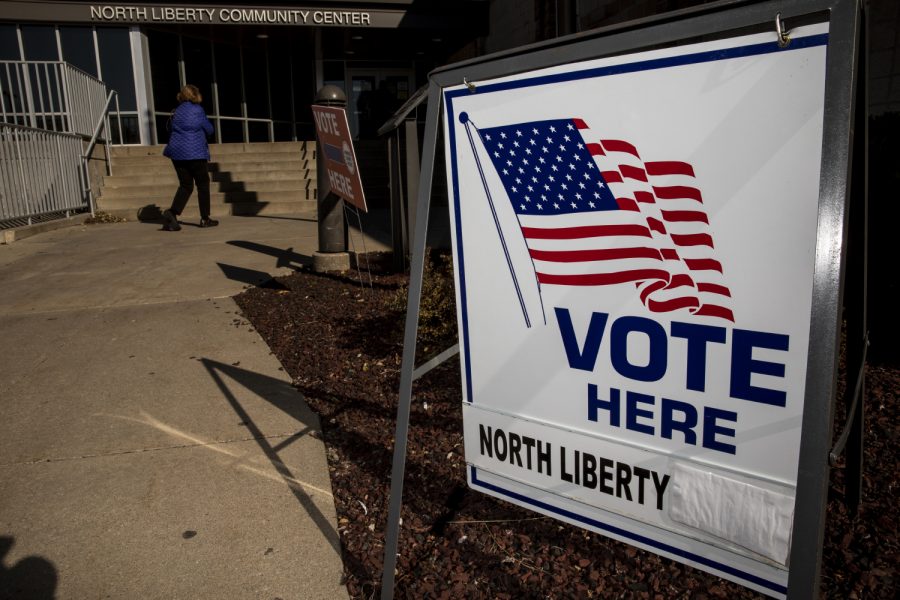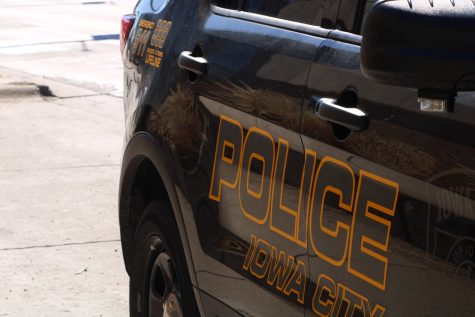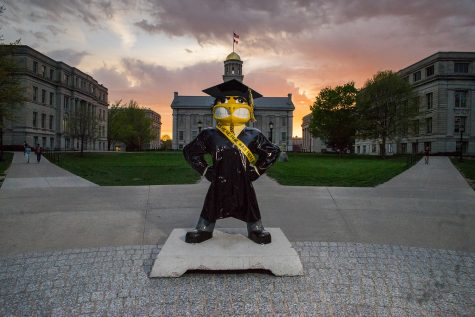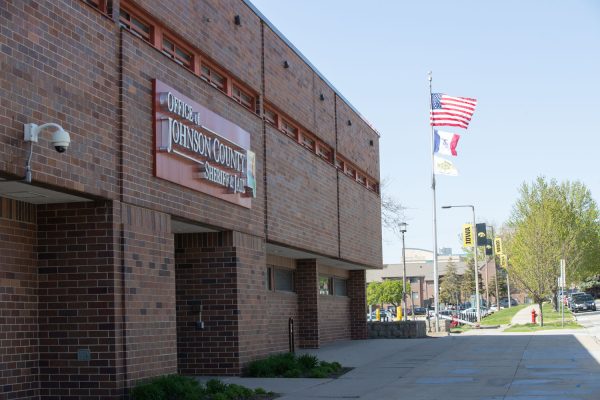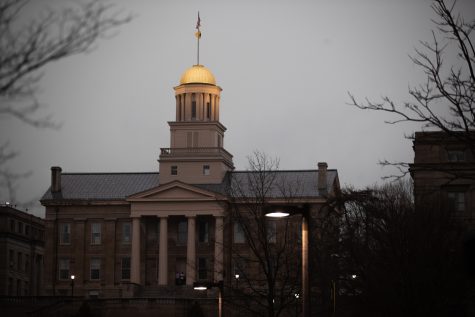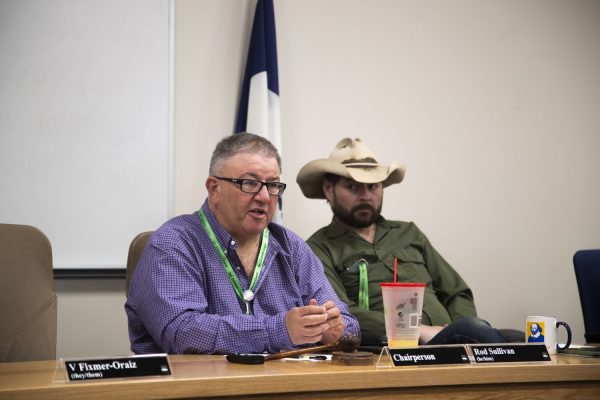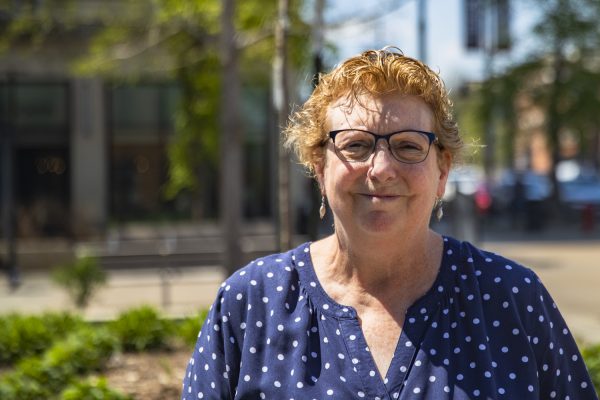Candidates line up in Johnson County Board of Supervisors race
Republicans and Democrats nominated their candidates for the Johnson County Board of Supervisors race over the past week, and one candidate will run as an independent.
A sign marking a polling location is seen outside the North Liberty Community Center in North Liberty on Tuesday, November 3, 2020. In 2016, Johnson County was one of six Iowa counties to vote for a democratic presidential candidate, according to the New York Times.
May 12, 2021
Three candidates will run in Johnson County’s special election on June 8 to fill a vacant spot on the Johnson County Board of Supervisors.
Democrats and Republicans nominated their candidates for Johnson County’s Board of Supervisors race this week, and Democrat Brian Campbell will run as an independent.
The Johnson County Republicans had their nominating contest on May 8, where they voted 11-8 to nominate Phil Hemingway, an Iowa City mechanic and former Iowa City School Board member, to be the party’s candidate.
Micah Broekemeier, a 29-year-old University of Iowa student, also ran for the nomination, receiving eight votes.
On Tuesday, Democrats met at the Johnson County Fairgrounds to choose their candidate for the election. The field was a little more crowded. Four candidates were on the Democrats’ ballot:
- Deputy County Treasurer Scott Finlayson
- Coralville City Councilor Meghann Foster
- Former Lone Tree Mayor Jon Green
- Johnson County Public Health Educator Susan Vileta
After three rounds of voting in which the lowest vote-getter was eliminated, Green beat out Foster 139-137 for the nomination.
The election for the Board of Supervisors will take place on June 8. May 24 is the voter pre-registration deadline and the deadline to request an absentee ballot.
Jon Green
Green knew getting the Democratic nomination wouldn’t be easy. Going against three accomplished Democrats, he said he was surprised he’d gotten the most votes on the first ballot.
“I had known that this was going to be a big lift,” he said. “I had no illusions that this thing was going to be easy. The quality of the other candidates was pretty plain.”
Green, 38, resides in Lone Tree, Iowa and was the mayor of the town of about 1,300 from 2018-2019.
He said having someone from the rural parts of the county will help ensure representation on the board. He said he doesn’t think the current supervisors ignore rural Johnson County, but that his experiences give him a better window into rural areas’ needs.
“Just by virtue of my feet being where they’re at, I do have a different perspective,” he said. “I run in different social circles that they do, I do my shopping in different places than they do. So it’s just, I have a different lived experience.”

Green isn’t timid about his policy positions. A self-described leftist, Green has advocated for police abolition and ending the drug war and legalizing drugs, moving to a public health approach rather than a criminal one.
He said he’s in favor of diverting funds from the Johnson County Sheriff’s Office to mental health services and other non-armed emergency services. He said money should be spent identifying the underlying causes of crime, rather than on police.
“We need to get folks that are trained in mental health, substance abuse, deescalation and conflict resolution need to be on the front lines of many more 911 calls,” he said.
Johnson County will receive about $29 million in COVID-19 relief funds from the American Rescue Plan, and Green said he wants to see those funds go to the most vulnerable in the county.
He said the county should actively find people who need the money and assist with paperwork and hurdles to receiving the funds.
“We cannot just put this pot of money out curbside and say, ‘if you need it come and take it,’” he said. “We’ve got to make sure we’re identifying folks who need assistance and helping them to get it.”
Born in Wyoming, Green grew up in and around Johnson County, and graduated from Morningside College in Sioux City. He was a state delegate for Bernie Sanders’ 2016 campaign, and was on the Iowa Democratic Party State Central Committee from 2016 to 2018.
Sanders endorsed Green’s supervisor campaign before the Democratic convention, saying he appreciated Green’s work as mayor of Lone Tree.
Phil Hemingway
In his fourth run for a seat on the Board of Supervisors, Hemingway says he’s an “eternal optimist,” running as a Republican in the most Democratic county in the state.
One thing both candidates agree on is a desire for more rural representation on the board. Hemingway, who lives in a rural area outside Iowa City, has been hammering that message since his first run for the office.
“All the candidates now are talking about rural representation,” he said. “They’re talking about trying to make that connection with people in small towns and people that live in the country. And that was what I started my campaign with.”
Another consistent pitch across his previous campaigns, Hemingway said his election would put a check on the “one-party rule” on the all-Democratic board. He said his perspective would bring a new voice and new ideas to the county government.
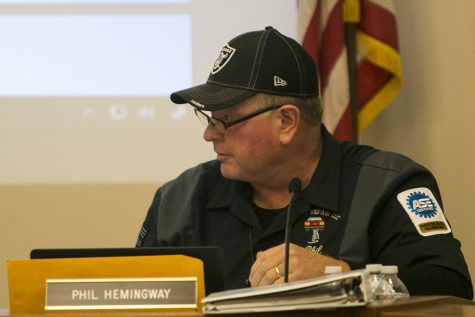
A Republican hasn’t been elected to the Board of Supervisors since 2013, when Republican John Etheredge won by less than 200 votes in a special election. Democrats outnumber Republicans in the county more than two to one.
“When you have five people in full agreement discussing an issue, you get a lot of heads nodding and everything, but you don’t get a lot of challenging ideas or different perspectives,” he said.
On the federal relief money coming into the county, Hemingway said he wants to make sure the county prioritizes things that are necessities and spend it in a way that will be appreciated long-term. One thing he mentioned was improving roads and bridges in rural areas.
“There’s a lot of things that it can be spent on, but I want to hear from the community as well, as far as what they want as opposed to me saying this is what I want for them,” he said.
Hemingway’s previous experience includes serving on the Iowa City Community School District Board for four years, where he said exercised fiscal oversight and helped ensure money was being spent wisely. He also helped to change the pesticide policy at the district to remove certain chemicals from use on school grounds.
“I’m not afraid to say no to things and make a stand and be the lone vote against those things and to make sure that the community is aware of what’s going on,” he said. “…I just hope people just give me a fair look and don’t just look at the consonant at the end of my name and make an assumption.”
Brian Campbell
Campbell, a rural Iowa City resident, said he decided to run as an independent because he didn’t think he’d get the nomination, but he thinks his independent voice will resonate with Johnson County.
Campbell is a former journalist who works for Johnson County Seats and has had involvement in Johnson County politics. He’s a twice-elected East Lucas Township Trustee, he was previously a delegate for the Johnson County Democratic Central Committee, and he worked on current supervisor Pat Heiden’s steering committee when she was elected in 2018.

Echoing the need for rural representation on the board, Campbell said he wanted to bridge the gap between Johnson County’s urban and rural communities. He said rural residents often have the sense that the board ignores their interests.
“How are you going to solve water quality problems without working with the people who take care of the land?” he said. “…How do the farmers and people in the county get new bridges and roads without the people inside the city limits paying their taxes? It’s beneficial to both people to work together.”
Another goal Campbell has by not running with a party is to usurp partisanship and take a middle-ground approach to the issues facing the county. While he is clear he’s a Democrat, he also said he wants to represent the tens of thousands of non-Democrats in the county and approach questions with that in mind.
“I think a lot of people out there are tired of the partisanship of government, and they want somebody who can see things objectively,” he said.
Campbell said he’d want to look at the county’s budget to decide what to spend the incoming American Rescue Plan dollars on. He said often things that were planned for need to be cut when reassessing a budget, so some of the money can go to restoring cut programs and budget items.
He also said he’d expect to see the money spent on social services, infrastructure, and rent relief.
“People who lost their jobs or were laid off and needed to pay their bills, well that’s a priority,” he said. “But again, every budget you can look back at things and say, ‘we wish we had another $10 or $20,000 for this that we don’t have.’ Well here’s your chance to go back and reexamine that.”



